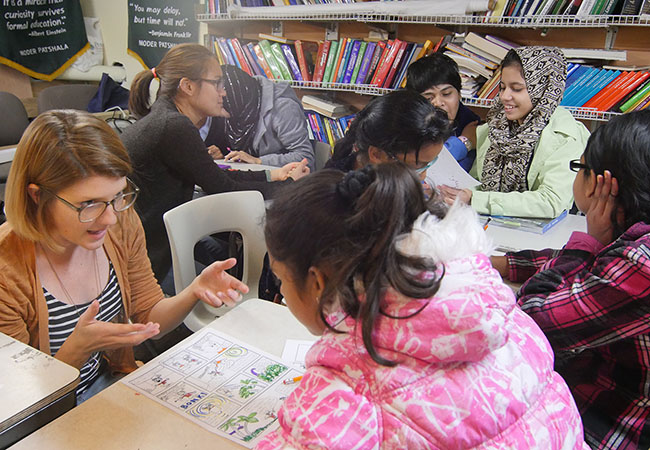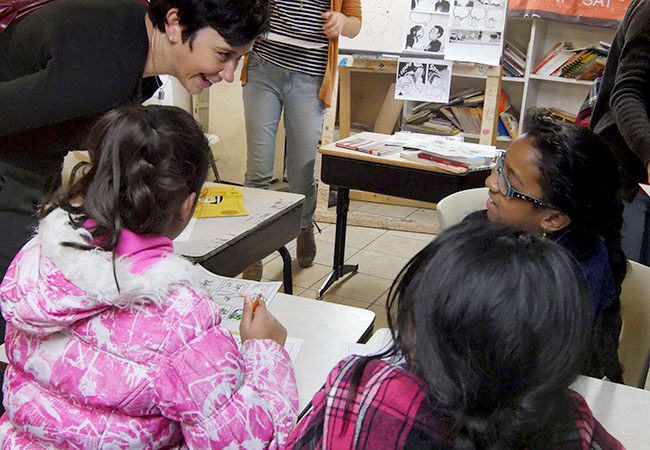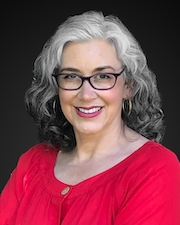At Moder Patshala, education is a community activity

From the outside, Moder Patshala looks like many other brick homes in West Philadelphia. But walk through the front door, and a narrow hallway leads to a classroom in the back, and a stairwell covered in pictures about Bangladeshi culture leads to a basement chock-full of books, desks, and a small row of computers. On any given weeknight, these two rooms are bustling with Bangladeshi-American elementary- and middle-grades children working on homework or being guided through focused literacy lessons with students from Penn GSE’s Educational Linguistics Division.
In the upstairs classroom, Anne Pyzocha and Fiona Zhu, two students in Penn GSE’s TESOL master’s program, guide younger elementary students through a literacy lesson on global warming, polar bears, and the Arctic. Pyzocha, a first-year student from Chicago, IL, asks students to find the Arctic on a globe.
“Can you show me where the Arctic is in relation to Philadelphia?” Pyzocha asks. “How about Bangladesh? Let’s find that on the map.”
The students hug the globe, pointing to one country, then the next. They return to worksheets, where they draw and write about activities they can do to help the environment. Zhu, from Canton, China, works with students who missed the last session, reading to them from a book about polar bears.
While some of the students chatter in English, others switch into Bangla as they work on their worksheets. “We encourage the students to use Bangla to communicate and help each other out when they need to,” Pyzocha said. “I feel as though there are many instances in classrooms where that is discouraged, but we don't do that when working there. Something I have learned at GSE is that a person's first language is a great tool and resource that should not be ignored when trying to acquire a second language.”
* * *
Ali Zaker and Najneen Kabita first opened the doors of their home as an afterschool homework help center in 2004. As recent immigrants and soon-to-be parents, Zaker and Kabita were concerned with making sure children in the Bangladeshi-American community had access to tools and resources to help in their academic development. From just a few children at first, their regular attendance has boomed to nearly sixty students. Bangladeshis are a relatively new – and largely invisible – immigrant community in Philadelphia and neighboring Upper Darby. According to Penn’s Associate Director of Asian American Studies, Fariha Khan, the community largely does not access public services and faces an immense challenge with language barriers.
Anne Pomerantz, a Senior Lecturer in Educational Linguistics, first saw Zaker and Kabita at a community meeting with the School Reform Commission about Philadelphia school closings. She was impressed by the couple, who brought more than fifty parents with them as they testified about what would happen to ESL programming if their neighborhood school closed. As a language teacher, School District parent, and West Philadelphia resident, Pomerantz shared Zaker and Kabita’s concerns. A few months later, she saw Zaker again at another community meeting and told him about the TESOL program at Penn GSE and its long-standing commitment to community engagement. For the past three years, Pomerantz and her linguistics students have provided homework help and started literacy circles. This year, the partnership has expanded to include students from Betsy Rymes’s course in Intercultural Communication.
Zaker and Kabita’s daughter Maimoonah, a 10-year-old fifth-grader at Masterman, visited Penn GSE at the start of the semester. “It’s important you don’t just give us the answers,” she told the graduate students. “If you do that, we will never learn.”
* * *

Downstairs, Penn GSE students Jess Pastore and Wichayapat Piromsan work with older elementary students who are learning to make their own graphic novels. The students work in pairs, integrating the night’s key lessons on narrative development, onomatopoeia, and dialogue into their stories.
Maimoonah and Salsi, a 10-year-old fifth-grader at Lea, develop a character with the power of invisibility. Pomerantz, the professor of this fall’s Teaching Second Language Writing course, kneels beside their desk and prompts them to think through just what invisibility means. “How did your character become invisible?” Pomerantz asks, “Is the character invisible to everyone?”

Nearby, parent Syed Hassan looks on, his young child clinging to his leg. He lives just a couple blocks from Moder Patshala. He learned about the program not long after moving to Philadelphia from California a couple months ago, and quickly enrolled his 7-year-old daughter, Sumaiya, a student at Lea Elementary.
“After a month, I saw a difference. She is doing very good in school now,” he said.
The program relies on parent volunteers, and Hassan tries to volunteer one day per week to understand what his daughter is learning, as well as to learn more about education in general. “It’s really amazing. It’s really helpful for the community, and also for the students. And there are the ESL classes for the parents, too.”
But the impact on learning goes both ways, something Pomerantz’s students praise about the program.
Piromsan, a second year master’s student in the TESOL program who hails from Bangkok, Thailand, emphasized that Moder Patshala reinforces the context-dependent nature of teaching.
“Teaching is more complex than just figuring out the content to teach and simply teach it,” Piromsan said. “We have to take a lot of factors into consideration: who the learners are, what are their needs, where are they in the English language proficiency spectrum, what is possible (or not possible) to achieve.”
Pomerantz notes the diversity of her own students this year – from France and Chile and China and Taiwan and Thailand and across the United States – means discussions about intercultural communication are ever-present in the classroom.
* * *
As the night comes to a close and students trickle out the door, Kabita reflects on the past eleven years. “We are proud of our work,” she says, “but it will never end.”
Indeed, they are certainly at capacity in their home, and would love to be able to move into a bigger space to serve more members of the community. They would like to serve not only Bangladeshi students, but the wider neighborhood, too. The classrooms in the house hold a special place, though. Zaker chimes in: “When Moder Patshala is closed, there’s no light. When it’s open, my whole house is laughing.”
For Penn GSE students, working at Moder Patshala situates their learning in Philadelphia. “I cannot begin to put into words how rewarding it is to be able to not only give back to the community in West Philadelphia, but also help these children and families with their new lives in Pennsylvania,” Pyzocha said.

